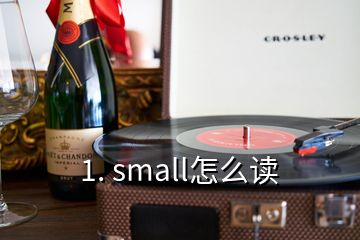1. small怎么读

家庭的英语:family
读音:英 ['fæməli] 美 ['fæməli]
n. 家庭;亲属;家族;子女;[生]科;语族;[化]族
adj. 家庭的;家族的;适合于全家的
词汇搭配:
1、big family 大家庭
2、broken family 破裂的家庭
3、happy family 幸福的家庭
4、small family 小家庭
常见句型:
1、She comes of a musical family.
她出身于一个音乐家庭。
2、She comes from a famous family.
她出身于名门望族。
3、He is a boy of a good family.
这个小伙子出身于很好的家庭。
4、We shouldn't judge a person by his family.
我们不应以出身门第来判断一个人。
参考资料:
词义辨析
family, dwelling, home, 这三个词都有“家,家庭,家宅”的意思。其区别在于:
1、home指某人出生以及成长的环境或与某人一起居住的地方。
例句:There's nothing like home.
哪儿也没有家里好。
2、dwelling为文学用语,用以同商店、办公室及其他建筑物相区别的住宅。
例句:Their clothes were in rags and their dwellings were small and poorly furnished.
他们衣衫褴褛,住房狭小,家具简陋。
3、family指的是家庭成员,与居住地无关;
例句:Because our family is happy and healthy we reckon ourselves fortunate.
因为我们一家人幸福健康,我们认为我们是幸运的。
2. mouth怎么读

英式读法 [maʊθ] 。美式读法 [maʊθ]。 作名词意思是口;开口;河口。 作动词意思是不出声说;装腔作势地说;喃喃地说。 名词复数是mouths。过去式是mouthed。过去分词是mouthed。现在分词是mouthing。第三人称单数是mouths。 短语
1、make one's mouthwater 使人垂涎
2、open one's mouth 张嘴
3、put words into sb's mouth 教某人说些什么话
4、screw up one's mouth 撅起嘴
5、shoot off one's mouth 信口开河,夸夸其谈
3. short怎么读
一、shorts
英 [ʃɔ:ts] 美 [ʃɔ:rts]
n.短路;(从事运动或天气炎热时穿的)短裤;<美>男人的短内裤;电影短片;短裤( short的名词复数 );缺乏
例句:
1、The shorts had blue embroidery over the pockets
这条短裤的口袋上有蓝色刺绣。
2、Women athletes wear cropped tops and tight shorts.
女运动员穿着短上衣和紧身短裤。
二、pants
英 [pænts]
n.<英>(紧身的)短裤;<美> 裤子;喘气( pant的名词复数 )
v.喘气,喘息( pant的第三人称单数 );喘着气说
1、He was wearing cotton pants and an open-necked shirt.
他穿着纯棉裤子和开领衬衫。
2、Waterproofed fabric pants are more expensive than plastic pants.
防水纤维短裤比塑料短裤贵多了。
扩展资料:
同义词
一、knickers
英 [ˈnɪkəz] 美 [ˈnɪkərz]
n.短裤;内裤;衬裤;灯)恼火笼裤
例句:
1、She bought herself a nice pair of knickers.
她给自己买了一条漂亮的短衬裤。
2、She bought Ann two bras and six pairs of knickers.
她给安买了两件胸罩、6条内裤。
二、breeches
英 [ˈbrɪtʃɪz] 美 [ˈbrɪtʃɪz, ˈbritʃɪz]
n.马裤;短裤;妄自尊大;目中无人;臀部( breech的名词复数 )
例句:
1、What have you done with your coat and your hat and your breeches?
噢,你的上衣,你的短裤,还有你的帽子,你都怎么啦?
2、The boy put on his breeches and went out for a ride.
男孩穿上马裤,出去骑马了。
4. small怎么读英语单词
big,英语单词,形容词、副词、名词,作形容词时意为“大的;重要的;量大的”。作副词时意为“大量地;顺利;夸大地”。作名词时意为“人名;(土)比格”。
5. cute怎么读
可爱的
cute
中文发音类似于:克油特
音标:英[kju:t] 美[kjut]
adj. 可爱的;漂亮的;聪明的,伶俐的
[例句]At first, I just wanna have a date with her, but then I found out she was such a cute girl.
他的意思就是:刚开始的时候,我就只是想和她约会看看,但后来我发现她可真是个可爱的女孩。
[其他] 比较级:cuter 最高级:cutest
6. small怎么读音标
英文原文:
small tomato
英式音标:
[smT衛] [tY萴ɑ衪Y奭
美式音标:
[smTl] [tY萴eto]
7. head怎么读
不一样。head中ea读/e/。而seat中ea读i:
8. small怎么读 英语什么意思
little 和 small的区别如下:一、两者都可以表示面积和体积的“小”,但small只是做客观描述;而little则通常带有一定的感情色彩(如高兴、满意、同情等),多用在口语中。例句:
1、I’d like to have a little house of my own. 翻译:我想拥有属于自己的小房子。
2、This pants size is so small, you also can be gonna fit.翻译:这条裤子尺寸如此小,你竟然都能穿的下。Don’t worry about such small [little] things. 翻译:不要为那样的小事烦恼。She is always busy with small things. 翻译:她总忙于琐事。三、两者都可以表示量少,small 通常只放在某些具有数量意义的名词前(如 sum, number, amount, quantity, income 等),而 little 则直接放在不可数名词前表示量。例句:a little money 一点点钱a small amount of money 一小笔钱
9. small怎么读英语发音
“very”的读音是:英 [ˈveri] 、美 [ˈvɛri]
very的主要词性和意思:
adj.很,非常; 恰好是,正是; 十足的; 特有的
adv.很,非常; 充分,完全;
例句:
1、ADV 很,非常(用于修饰形容词或副词,表示强调)Very is used to give emphasis to an adjective or adverb.
The problem and the answer are very simple...
问题和答案都非常简单。
It is very, very strong evidence indeed...
这的确是非常非常有力的证据。
2、PHRASE 绝不;远非;不太;稍微Not very is used with an adjective or adverb to say that something is not at all true, or that it is true only to a small degree.
She's not very impressed with them...
她对他们没什么印象。
4、ADV 完全,最(用于修饰形容词或副词最高级,表示强调)You use very to give emphasis to a superlative adjective or adverb. For example, if you say that something is the very best, you are emphasizing that it is the best.
They will be helped by the very latest in navigation aids...
他们将会受益于最新的导航系统。
5、ADJ (与某些名词连用,以确指最远的某一位置或时点)极端的You use very with certain nouns in order to specify an extreme position or extreme point in time.
At the very back of the yard, several feet from Lenny, was a wooden shack...
在院子的最后面离伦尼几英尺远的地方有一个小木屋。
I turned to the very end of the book, to read the final words...
我翻到书的最后一页去读最后的文字。
6、ADJ 正是的;合适的;同样的You use very with nouns to emphasize that something is exactly the right one or exactly the same one.
Everybody says he is the very man for the case...
每个人都说他是接手这个案子的最佳人选。
She died in this very house...
她正是在这间屋子里死去的。
7、ADJ (与名词连用,强调重要性或严重性)仅仅的,唯独的,甚至于,就连You use very with nouns to emphasize the importance or seriousness of what you are saying.
At one stage his very life was in danger...
他的生命都曾一度处于危险之中。
8、CONVENTION 好的,是(用于表示对上级的指示或命令遵照执行)Very good is used to tell someone in authority that you agree to carry out a suggestion or order.
'Now give me some account of your voyage.' — 'Very good, sir.'
“现在给我讲述一下你的航程吧。”——“非常乐意,先生。”
9、PHRASE 的确如此;千真万确The expression very much so is an emphatic way of answering 'yes' to something or saying that it is true or correct.
'Are you enjoying your holiday?' — 'Very much so.'
“你的假期过得愉快吗?”——“非常愉快。”
10、CONVENTION 那好吧,行(用于表示同意或接受,即使不是完全满意)Very well is used to say that you agree to do something or you accept someone's answer, even though you might not be completely satisfied with it.
'We need proof, sir.' Another pause. Then, 'Very well.'...
“我们需要证据,先生。”又是一个短暂停顿。然后,“那好吧。”
10. nose怎么读
你好!nose 英[nəʊz] 美[noʊz] n. 鼻子; 嗅觉; 芳香,香气; 突出的部分; vt. 嗅出,闻出; 用鼻子触; 用鼻子品评(酒)等; 探出; vi. 小心探索着前进; 探问; [例句]She wiped her nose with a tissue她用纸巾擦了擦鼻子。
11. small怎么读音发音 音标
不一样的 small英 [smɔ:l] 发音 s mosmell 英 [smel] 发音 s mao